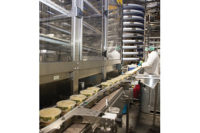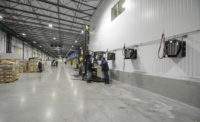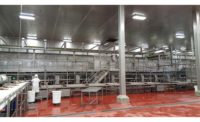West Liberty Foods—more than just protein solutions
West Liberty Foods was named Refrigerated & Frozen Foods' 2017 Refrigerated Foods Processor of the Year.

The Bolingbrook, Ill., production facility produces over 100 SKUs for retail and foodservice chains nationwide.

Ed Garrett, president and CEO, joined West Liberty Foods in 1999, bringing with experience in co-packing for quick-service, retail and foodservice customers.

(Standing) Ed Garrett, president and CEO, and (sitting) Aliza Katz, corporate executive chef and director of culinary innovation.

West Liberty Foods purchased the 230,000-square-foot Bolingbrook, Ill., facility from Quantum Foods in 2014.

West Liberty Foods works with its partners to deliver on-trend foods with stronger, bolder flavors.

West Liberty Foods has grown from a small co-op owned by 47 individual farmers to a cutting-edge protein processor employing 2,600 people across four manufacturing facilities.

Corporate executive chef and director of culinary innovation Aliza Katz works with the culinary team to elevate comfort classics, transform fast food menu concepts and deliver on-trend profiles.









For years, West Liberty Foods has provided an assortment of value-added protein solutions, from par-fry and individually-quick frozen (IQF) products like chicken wings and breaded appetizers to fully cooked items like meatballs and sausages. But, for the folks at West Liberty Foods, it’s not just about the protein solutions.
“We build relationships. I don’t want to be a supplier to a fast food chain. I don’t want to be a supplier to a grocery store. I don’t want to be a supplier to a mid-tier fast-casual dining restaurant. I want to be a partner in their business,” says Ed Garrett, president and CEO. “I want myself and my team to know their business as well as they know their business. So, we know where their challenges are. We know where their successes are. We know where their failures are. And, their failures and successes are our failures and successes.”
Since its inception in 1996, West Liberty Foods has become a pioneer in all things sustainable. For instance, in 2007, the West Liberty, Iowa-based company became what is said to be the first U.S. manufacturer to use 10-foot logs in its everyday slicing operations, and opened a new Greenfield facility in Tremonton, Utah, which has since undergone four different expansions.
In 2012, West Liberty Foods was dubbed the first U.S. manufacturer of its size to become landfill-free by NSF International, Ann Arbor, Mich. Then, in 2013, it installed high-pressure processing (HPP) equipment, and in 2016, opened a state-of-the-art cold storage and distribution facility in Bolingbrook, Ill., situated just five miles from its newly acquired manufacturing plant, also in Bolingbrook. For more on the Bolingbrook manufacturing plant and Liberty Cold, go to "How HPP, 3PL Services Funnel Growth for West Liberty Foods."
That’s why West Liberty Foods was named Refrigerated & Frozen Foods’ 2017 Refrigerated Foods Processor of the Year.
Four generations of food processing
Over the years, West Liberty Foods has grown from a small co-op owned by 47 individual farmers from the Iowa Turkey Growers Cooperative (ITGC) to a cutting-edge protein processor employing 2,600 people across four manufacturing facilities—West Liberty, Bolingbrook, Tremonton and Mount Pleasant, Iowa.
In 1996, ITGC acquired the former Louis Rich facility in West Liberty to process turkeys and sell as raw material.
Then, in 2000, West Liberty Foods was born as a 100% further processing company, with a fully-cooked slicing facility in Mount Pleasant, a Greenfield plant in Tremonton, which is basically “a large kitchen,” Garrett says, because it imports, blends, seasons, cooks and packages raw materials, and the Bolingbrook site, which West Liberty Foods purchased from Quantum Foods in 2014.
“The Mount Pleasant plant has received patents for the design because of the hurdles we put in for listeria control,” Garrett says. “We also knew we needed to get into the cold storage and supply chain business. So, we built Liberty Cold. We first began as a turkey company. Then we became a meat company. Today, we’re very large in chicken, pork and beef. So, we gave our customers what they were expecting, what they needed on the fully protein side of the business. But, we had to turn it over to somebody else for the logistics, the moving, the transportation, the storage and the security of their product after it gets boxed. That next step is Liberty Cold.”
As part of its commitment to its partners, West Liberty Foods is home to patented clean room food processing systems, which include a series of individual slicing cells, each equipped with separate air handling systems, drainage systems, supplies and premier equipment to reduce the risk of pathogens.
The extension of six HPP lines throughout the various plants also helps West Liberty Foods to create new clean label, all-natural, antibiotic-free, veggie-fed-only products in a non-thermal, environmentally friendly environment.
“We’ve seen a big push over the last year of consumers turning to clean label and natural ingredients. More people are reading labels and becoming educated about what’s in their food,” says Garrett. “When you open your cupboard, you know what’s in there. That’s the product we want on our labels. If it’s not in our cupboard, why should it be in our products?”
West Liberty Foods delivers on trends by delivering foods with stronger, bolder flavors and working with its partners to learn more about what flavor profiles they want to bring to the customer. In fact, West Liberty Foods’ culinary R&D team consists of 20 employees with 160 years combined experience. Aliza Katz, corporate executive chef and director of culinary innovation, leads the company’s culinary initiatives by elevating comfort classics, transforming fast food menu concepts and delivering on-trend profiles.
“Customizing to our customer specifications is arguably the most rewarding part of what we do, as it builds trust and solidifies our relationships,” says Katz. “Assembling a culinary and R&D task force for each customer project is key. We gather the right resources, including our in-house food scientists, chefs from our ingredient company and agency partners, industry research and trends. I like to think of us as a trustworthy culinary solution collaborative team that delivers quality, delicious food products with focus on protein-forward custom products.”
“It’s really a joint development between what the customer thinks they want to put in their restaurant or grocery store and what we can develop for them,” adds Garrett.
Obtaining landfill-free status
In December 2012, West Liberty Foods became one of the nation’s first companies to be verified landfill-free company-wide. Since the inception of the company’s recycling program five years ago, West Liberty Foods’ four facilities have eliminated nearly 520 million pounds annually of waste previously sent to local landfills.
The road to recycling began in 2009 when Garrett wanted to become a landfill-free company. So, he and the Tremonton team visited the local landfill to check out the impact its blue plastic casings used on bin liners would make on the environment.
“When we went to the landfill, we just saw a blue mountain of the impact that our company was doing at just one landfill,” Garrett says. “It was really a wakeup call. We were putting a footprint on the landfill. And, we knew it was West Liberty Foods because we used the blue packaging liners.”
As a result, West Liberty Foods implemented an internal recycling program that consisted of a 5-part plan—first, identify the waste streams, work with local vendors to determine recycling options, educate all employees, then place 15-16 different sorting bins for employees to recycle product from the production floor as well as from the cafeteria, and lastly, receive certification from a third-party vendor such as NSF International. Environmental, health and safety director Michelle Boney was a driving force in the efforts, implementing small process changes that led to large waste reductions.
“Commitment from company leadership and awareness of employees are key to successfully making the change,” Boney adds. “Working together, we developed a way to do things differently, implemented new processes and finding an alternative for all waste.”
Fast forward to a year later, and the Tremonton landfill consisted of zero blue liners.
“Becoming landfill-free was just the right thing to do, and the only thing we should do,” says Garrett. “As a result, we have about 2,600 employees company-wide who’ve decided to recycle inside their homes, so that’s another footprint we’ve eliminated. And, when we decided that we were going to take this challenge on, we had to take our partners with us. We talked about changing non-recyclable plastic wrap to recyclable options. We discussed how to reduce the boxes that the film comes in, and design that to lower the amount of material coming in. It was also about educating our suppliers and our partners to make sure that their raw materials coming in would fit into our waste chain.”
West Liberty Foods still produces value-added protein solutions for retail and foodservice customers nationwide and internationally, but continues to evolve by delivering a side of sustainability, food safety and flavor.
“I’m not a guy that just sits back and says, ‘okay, we’ve accomplished that. Let’s be happy and just stay at this point.’ If you’re ready to grow, then you should grow. I hope we’re always in the position to grow, and take our partners with us.”
Looking for a reprint of this article?
From high-res PDFs to custom plaques, order your copy today!














